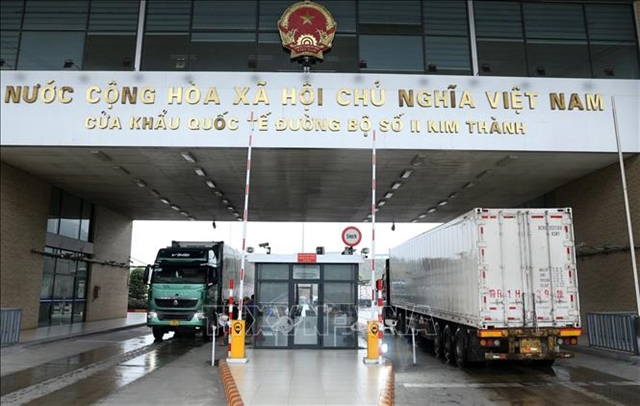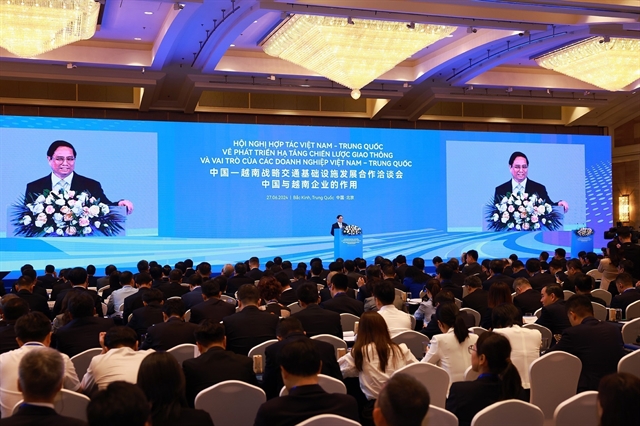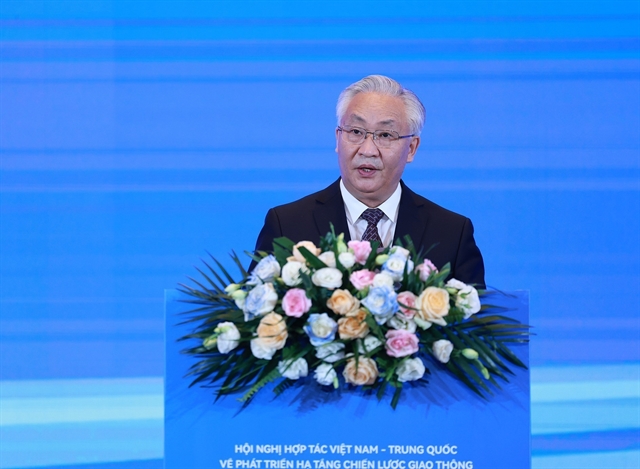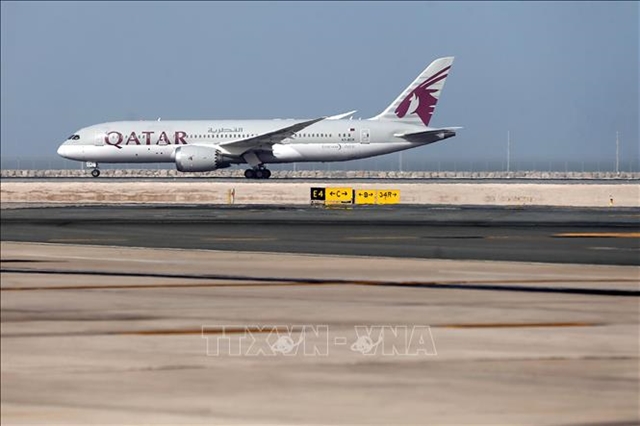 Economy
Economy

 |
| Vietnamese Prime Minister Phạm Minh Chính addresses the 'Việt Nam-China Cooperation on Strategic Transport Infrastructure Development and the Role of Vietnamese and Chinese Enterprises' conference. — VNA/VNS Photo Dương Giang |
HÀ NỘI — Vietnamese Prime Minister Phạm Minh Chính and Chinese Vice Premier Zhang Guoqing on Thursday co-chaired the conference 'Việt Nam-China Cooperation on Strategic Transport Infrastructure Development and the Role of Vietnamese and Chinese Enterprises' held in Beijing, China.
Quoting the Chinese proverb “If you want to get rich, first build roads,” Chinese VP Zhang Guoqing stated in his address that over the years, China has developed a comprehensive, safe, sustainable and highly efficient transport system, including world-leading highways, high-speed railways, airports and seaports.
Moreover, China has extended its cooperation and investment in transport infrastructure to countries in the region, such as Cambodia, Indonesia and Laos.
He noted that Việt Nam and China share both land and maritime borders, with transport connections between the two countries including air, sea, road and rail. The two sides have cooperated on several Vietnamese transport projects, such as the Cát Linh-Hà Đông urban railway and the first metro to be operational in Việt Nam's capital city Hà Nội.
The visits by Vietnamese Party General Secretary Nguyễn Phú Trọng to China (late 2022) and Chinese President Xi Jinping to Việt Nam (December 2023), along with the meeting between President Xi and Prime Minister Phạm Minh Chính on Wednesday, have all touched on the need to promote the cooperative partnerships.
Under the 'Comprehensive Strategic Cooperative Partnership and the Việt Nam-China Community with Shared Future', the two will focus on more practical, effective and sustainable development, including infrastructure connectivity, especially transport infrastructure in line with China’s 'Belt and Road Initiative' and Việt Nam's 'Two Corridors, One Economic Belt' framework, according to the Chinese VP.
The Chinese official said the country welcomed the collaboration of agencies and enterprises from both countries to foster cooperation in various fields, particularly transport development and connectivity. He stressed the need for the participation of both State-owned and private enterprises in this important mission.
 |
| Chinese Vice Premier Zhang Guoqing addresses the conference in Beijing, China. — VNA/VNS Photo Dương Giang |
PM Chính highlighted the strategic significance of developing a Việt Nam-China transport infrastructure, stating that it is an objective necessity given the geographical proximity of the two countries.
This connectivity facilitates people-to-people exchanges, trade and regional and international integration, allowing China to access ASEAN via Việt Nam and vice versa.
With advanced vision and thinking, China has developed a comprehensive, modern transport system. Việt Nam seeks to learn from China’s experience in strategic transport infrastructure cooperation, the Vietnamese Government leader stated.
Regarding cooperation of three rail lines connecting China with Lào Cai - Hà Nội - Hải Phòng, Lạng Sơn - Hà Nội and Móng Cái - Hạ Long - Hải Phòng, Việt Nam is focusing on implementation with a cautious and thorough approach.
PM Chính candidly acknowledged that the results of strategic transport infrastructure cooperation have not met the potential, strengths and desires of both sides.
Challenges remain in the railway system due to differences in track gauge, in river transport due to low clearance of border bridges and difficulties in connecting expressways. Some major strategic infrastructure projects have yet to be implemented, and unresolved issues persist in unfinished cooperation projects, he said.
There are a limited number of Chinese enterprises participating in strategic infrastructure development and none have engaged in public-private partnerships (PPP). Mechanisms for mobilising resources are still challenging, inflexible, and inefficient, PM Chính added.
PM Chính urged the early implementation of three rail projects, especially the Lào Cai - Hà Nội - Hải Phòng line, and asked for Chinese enterprises' involvement in urban railway projects in Hà Nội and HCM City via PPP.
He revealed that the Government plans to assign relevant agencies to study and propose an inter-governmental agreement to coordinate the implementation of the three northern railway projects. Once these projects are relatively advanced, expansion to other lines with high demand will be considered, focusing on preferential loans from China, technology transfer, and training personnel to help Việt Nam develop its railway industry.
PM Chính also called for the expansion of air routes between the two countries, increasing the frequency of high-demand flights, along with other encouraging policies to promote Việt Nam-China tourism. He urged the rapid implementation of road projects connecting the two countries, especially expressways and border road bridges.
Addressing the enterprises of both countries, PM Chính urged stronger cooperation through joint ventures and partnerships under the principles of “harmonised interests, shared risks” and “cooperation for mutual benefit and development"
At the conference, ministries, agencies and transport infrastructure enterprises in both countries shared insights on the development of transport infrastructure, good practices, practical lessons and suggestions for cooperation in Việt Nam, particularly in planning, design, resource mobilisation, land clearance, operation management and the application of information technology and digital transformation.
In concluding the conference, PM Chính emphasised the need for China’s support in concessional loans, advanced technology, and training of human resources for Việt Nam's transport development, especially green transport and smart management.
He called on major Chinese corporations to invest and bid in large projects, particularly breakthroughs in transport, digital transformation and clean energy.
He encouraged joint ventures and partnerships between enterprises from both countries, emphasising sincerity, effectiveness, and trust, while combating corruption and avoiding cost overruns. Enterprises should show readiness to invest, collaborate, and tackle challenges with a high spirit of determination. — VNS




